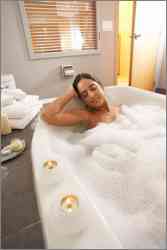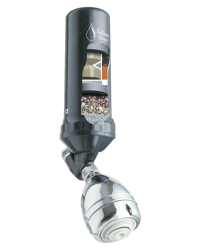How Not to Take a Bath:
5 Mistakes People Make When Bathing
by www.SixWise.com
Bathing has long been regarded as a therapeutic
way to relax your mind while cleansing your body. If done
correctly, taking a bath can:
|

When you soak in the tub, your skin's pores become
like a sponge -- which is why it's so important to use
only safe, natural products in your bath.
|
Yet, there are certain factors that can turn an otherwise
relaxing soak in the tub into a potentially harmful activity.
So to make sure that your bath time is safe and rejuvenating,
here is what NOT to do.
1. Do NOT Clean Your Tub With Toxic Chemicals
Many of the individual substances in a wide array of cleaning
products have been linked to cancer, reproductive problems
and damage to the central nervous system. And the type that
you can simply spray on, let sit, then wipe off (with no scrubbing)
are among the most noxious.
When you clean your tub with chemicals, not only do you have
the exposure to vapors while you're cleaning, but there will
be some residue left behind that can get into your bath water.
To clean your tub safely, use only natural cleaning products,
such as Vermont
Organics' Liquid Sunshine Non-Toxic Cleaner, or non-toxic
items you have around your house. Vinegar combined with baking
soda, for instance, is a powerful freshener for drains.
2. Do NOT Bathe With a Dirty Shower Curtain
Does your shower
curtain hang into your tub as you soak? Is there mold,
mildew or soap scum on your shower curtain?
Researchers have discovered that 80 percent of the germs
on shower curtains belong to the sphingomonads or methylobacteia
families. Such germs can infect open wounds as well as harm
those with weakened immune systems causing:
-
Urinary tract infections
-
Pneumonia
-
Abscesses in the gut
What can you do? Wipe down your shower walls, tub and curtain
on a frequent basis with an
ultramicrofiber wipe that cleans at the microscopic level.
Do not depend on regular cloths or chemical cleaners if you
are trying to eliminate germs (versus just wanting to eliminate
dirt). Instead, try ultramicrofiber wipes that contain a high
volume of microscopic fibers that each measure only 3 microns.
That's smaller than most bacteria!
What that means is that these wipes are capable of removing
virtually everything from a surface including soap scum and
biological contaminants. This is due to the fact that the
fibers have a naturally positive electrostatic charge and
dust and other particles are negatively charged, making it
easy for the ultramicrofiber wipe to thoroughly clean. Further,
regular towels and rags tend to merely smear germs around,
but the ultramicrofiber wipes will hold onto germs and never
let them go.
3. Do NOT Use Just Any Shower Gel
Personal care products are not regulated in the United States,
which means that just about anyone can throw together some
chemicals and fragrance and call it a shower gel. What they
don't tell you is that leading shower gels on the market can
contain ingredients that are linked to:
|
Shower Person?
There's Something You Should Know

If you regularly take showers, not baths, you need
to be aware of the hidden
danger lurking in your shower: chlorine and its
byproducts.
By taking a hot shower you end up absorbing over 600
percent more chlorine and other chemicals than you would
from drinking the same un-filtered water all day!
So please do your health, and your family's, a favor
by installing a top-of-the-line Wellness Shower Filter
into your shower.
The Wellness Filter effectively reduces up to 99 percent
of chlorine in your water. It also increases the hydration
of your skin and hair by 115 percent, and supports your
body's ability to resist undesirable bacteria &
fungus.
Get
The Wellness Filter: Used by the #1 Health Spa in the
World!
|
If you want to know what kind of chemicals are lurking in
YOUR favorite shower gel, simply type it into the Environmental
Working Group's Skin Deep database to find out.
Even among natural or organic personal care products, you
still need to be careful (there are no regulations for these
either). The general rule of thumb is, if you can't pronounce
the ingredients, don't use it.
One truly natural bodywash that we at Sixwise.com love is
Vermont
Soap Organics Aloe Castile Liquid Soaps. These USDA Organic
Aloe Castile Liquid soaps are made with natural and essential
oils, aloe vera and rosemary extract, and absolutely nothing
artificial. Plus they come in six fabulous all-natural scents
like Country Lavender, White Grapefruit and Sweet Orange.
4. Do NOT Soak in Chlorinated Water
Bathing in chlorinated water can be downright dangerous.
The warm water opens up your skin's pores, making it like
a sponge for chlorine. Meanwhile, the steam coming off the
water, which you readily inhale, is full of chlorine
and its byproducts as well. Since your skin is the largest
organ of your body, some estimates say that steam can transport
into your body up to 100 times the toxic chemicals as you
would get from drinking tap water.
What can you do? Install a filter that removes chlorine from
your water supply. If your tub can be filled up from your
showerhead, the best solution is The
Wellness Shower Filter. This system effectively reduces
up to 99 percent of chlorine from your shower's water for
up to 24 months, which is two or three times longer than any
other shower filtration system available.
The Wellness Filter is now also widely known for its ability
to enhance water beyond the reach of conventional water purification
systems, so that it actually improves the condition of your
hair and skin.
5. Do NOT Use HOT Water
Water that's too hot can scald your skin or cause it to become
dry. When taking a bath (or shower) use warm water to protect
your skin.
Recommended Reading
How
to Avoid the Hidden Danger Lurking in Your Shower
Bath
or Shower: Which is Better for You and Why?